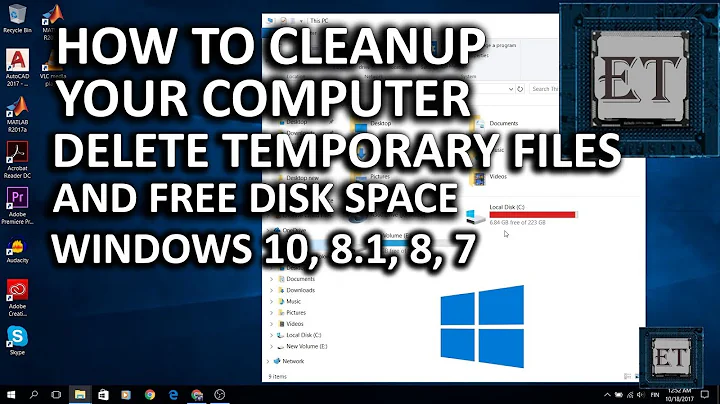Delete the first n bytes of files
Solution 1
for file in /foo/*
do
if [ -f "$file" ]
then
dd if="$file" of="$file.truncated" bs=31 skip=1 && mv "$file.truncated" "$file"
fi
done
or the faster, thanks to Gilles' suggestion:
for file in /foo/*
do
if [ -f $file ]
then
tail +32c $file > $file.truncated && mv $file.truncated $file
fi
done
Note: Posix tail specify "-c +32" instead of "+32c" but Solaris default tail doesn't like it:
$ /usr/bin/tail -c +32 /tmp/foo > /tmp/foo1
tail: cannot open input
/usr/xpg4/bin/tail is fine with both syntaxes.
If you want to keep the original file permissions, replace
... && mv "$file.truncated" "$file"
by
... && cat "$file.truncated" "$file" && rm "$file.truncated"
Solution 2
The following commands cut first 31 bytes from $file (using $file~ as a temp. copy):
dd if="$file" of="$file~" bs=1 skip=31
mv "$file~" "$file"
You only need to list or find all files under /foo/ and execute the two above for every $file found.
Solution 3
tail -c +32 outputs its input minus the first 31 bytes. (Yes, the argument is off by one.) To edit a file in place, use sponge in a loop, or if you don't have it and don't want to bother, do its job in the shell:
for x in /foo/*; do tail -c +32 "$x" | sponge "$x"; done
for x in /foo/*; do tail -c +32 "$x" >"$x.new" && mv "$x.new" "$x"; done
If the commands are interrupted for whatever reason (e.g. a power failure), it might be hard to figure out where you left off. Writing the new files to a separate directory would make things easier.
mkdir /foo.tmp
cd /foo
for x in *; do tail -c +42 -- "$x" >"/foo.tmp/$x" && rm -- "$x"; done
mv /foo.tmp/* /foo
rmdir /foo.tmp
If the files are really large (as in, large enough that having two copies of even a single one is a problem), you can use one of the techniques mentioned in this thread.
Solution 4
You can use Vim in Ex mode:
for each in /foo/*
do
ex -sc '%!tail -c+32' -cx "$each"
done
%select all lines!run commandxsave and close
Related videos on Youtube
von der tann
Updated on September 18, 2022Comments
-
von der tann over 1 year
I've got an extreme problem, and all of the solutions I can imagine are complicated. According to my UNIX/Linux experience there must be an easy way.
I want to delete the first 31 bytes of each file in
/foo/. Each file is long enough. Well, I'm sure somebody will deliver me a suprisingly easy solution I just can't imagine. Maybe awk?-
Angel Todorov almost 13 yearsAny awk/sed/ed solution will be line-oriented, so if you don't know the first line will be at least 31 characters then complications ensue.
-
-
 jlliagre almost 13 yearsSwapping bs and skip values will increase the performance.
jlliagre almost 13 yearsSwapping bs and skip values will increase the performance. -
 Gilles 'SO- stop being evil' almost 13 yearsSuggesting
Gilles 'SO- stop being evil' almost 13 yearsSuggestingddhere is overkill,tailis more appropriate (simpler, less risk of a killer typo, no spurious messages on stderr). -
 jlliagre almost 13 yearsYou are right. I usually avoid commands intended to process text files when processing possibly binary ones but "tail +32c" will work here.
jlliagre almost 13 yearsYou are right. I usually avoid commands intended to process text files when processing possibly binary ones but "tail +32c" will work here. -
Peter.O almost 13 years@jlliagre: You have written
cut(shouldn't that be tail? ... asis, it doesn't work for me... -
 jlliagre almost 13 yearsOf course, it's tail. Sorry about the mismatch.
jlliagre almost 13 yearsOf course, it's tail. Sorry about the mismatch. -
 Gilles 'SO- stop being evil' almost 13 years@jlliagre: On Solaris, you should have
Gilles 'SO- stop being evil' almost 13 years@jlliagre: On Solaris, you should have/usr/xpg4/binahead of/usr/binon yourPATH, or you'll be stuck in the early 1990s. Many unices (e.g. GNU, BusyBox) no longer support the historical+32csyntax, and take it to mean a file called+32c(as POSIX requires). -
 jlliagre almost 13 years@Gilles: I should indeed as I usually strongly support standard conformance but in that specific case, I'm afraid I won't switch soon. What refrains me to do it is that change would trigger a gazillion of issues with existing scripts, and would distance me from the community of Solaris users who in their very large majority are still using the traditional commands.
jlliagre almost 13 years@Gilles: I should indeed as I usually strongly support standard conformance but in that specific case, I'm afraid I won't switch soon. What refrains me to do it is that change would trigger a gazillion of issues with existing scripts, and would distance me from the community of Solaris users who in their very large majority are still using the traditional commands. -
Aryeh Armon almost 7 yearstail: cannot open '+32c' for reading: No such file or directory
-
 jlliagre almost 7 years@AryehArmon As stated in my reply, you can use instead "tail -c +32 $file" on POSIX systems.
jlliagre almost 7 years@AryehArmon As stated in my reply, you can use instead "tail -c +32 $file" on POSIX systems. -
Aryeh Armon almost 7 years@jlliagre this will give me last 32 bytes, correct?
-
 jlliagre almost 7 years@AryehArmon Incorrect, unless if the file size is exactly 64 bytes.
jlliagre almost 7 years@AryehArmon Incorrect, unless if the file size is exactly 64 bytes. -
Hameda169 over 3 years
mvchanges the file permissions. you can usecatinstead ofmvlike this:tail +32c $file > $file.truncated && cat $file.truncated > $file && rm $file.truncated@jlliagre




